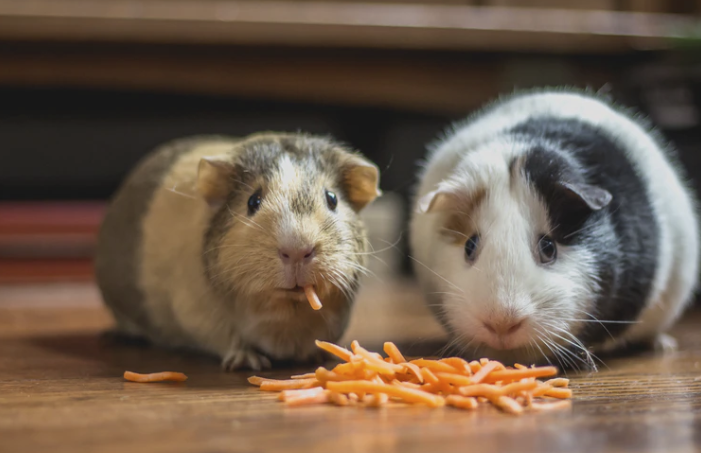
Guinea Pigs
Guinea pigs are cute and cuddly pets, and can be the perfect for younger children. Make sure your Guinea pig has all it needs with the great range of products from OlliePets.
Owning a guinea pig
Whether you’re looking for a first pet for your kids or a new friend for yourself, guinea pigs are a great choice. Small, social and low maintenance, they’re relatively easy to look after, making them an ideal pet to help teach young children about caring and companionship.

The domestic cavy is the only species of guinea pig kept as a pet, living on average for 5 to 6 years. These are sociable animals, so it’s important if you can keep them in pairs. Just because they’re quite easy to look after, it doesn’t mean you don’t need to be prepared. On the exciting day when you bring your guinea pig home, you’ll feel even better knowing you’re ready to give them the best life you can.
Caring for your guinea pigs
Guinea pigs aren’t keen on loud noises, which means they’re best suited to living outside in a hutch. Get one as big as you can so they have plenty of space to explore, with a large exercise area and secure shelter to rest. When it comes to their diet, your pet will need plenty of vitamin C and lots of fibre, so make sure you keep an eye out for this in their food. You also need to ensure that they always have access to plenty of hay and fresh water, as well as guinea pig pellet food.

All Products
Common health problems

These rodents originally come from the grasslands of the Andes in South America and are known for their inquisitive and sociable natures. Guinea pigs are straightforward to care for. You’ll need to provide them with a suitable home, feed them a suitable diet and know what to look out for when it comes to their physical and mental health.
What are common health problems with guinea pigs?
It’s possible for guinea pigs to suffer from a range of health issues, most of which can be treated easily once you’ve identified them. You should look out for signs of:
- Parasites: like all animals, guinea pigs can be vulnerable to certain parasites including lice, and mites and in rare cases fleas. Common symptoms usually include itchy skin, patchy fur or a change in appetite. You’ll need to use a specific treatment if you suspect they have an infestation
- Ringworm: the most common guinea pig health issue, ringworm is a fungal infection that can cause scaly skin and scabs. Plenty of vitamin C can help prevent this by boosting the immune system, while treatment can be obtained from your vet

- Bumblefoot: despite its funny name, this condition is far from amusing. It is when their feet become swollen and sore usually caused when guinea pigs walk on damp and dirty bedding material, so make sure you regularly clean out their homes
- Flystrike: this is a potentially fatal issue that is also caused by uncleanliness. It’s when flies are attracted to urine or poo stained fur or damp areas around your guinea pig’s bottom. Flystrike often doesn’t have immediately obvious symptoms, but it can be deadly. You can help prevent it from occurring by regularly cleaning their home, regularly checking their bottom and frequently changing their bedding material
- Dietary deficiencies: Ensuring your pet is getting the right vitamins, minerals and fibre to support their development is essential to avoid digestive issues. Vitamin C deficiency is especially prominent with guinea pigs, so it may be necessary to give them supplements if they’re not getting enough from their regular diet
![[object Object]](https://i1.adis.ws/i/petsathome/guinea_pig_at_vets.jpg?qlt=50&w=400)
If you don’t feed your guinea pigs enough or you give them foods that aren’t suitable for their digestive systems, you may find that they start to rapidly lose or gain weight, have difficulties going to the toilet, or even develop more serious problems. You should keep an eye on their toilet habits and even consider weighing them frequently to make sure they’re healthy.
- Milky eyes: guinea pigs with eyes that leak a milky discharge could be seriously ill. However, this is also something that naturally occurs when your guinea pig is about to groom themselves, so it’s important to know the difference between the two. If they produce a lot of discharge or it becomes more frequent, you should take them to see a vet
- Breathing problems: guinea pigs can be prone to developing breathing difficulties which are usually caused by a build-up of ammonia due to dirty bedding in their home. To avoid this, make sure you keep the home well-ventilated and regularly clean out their bedding material
- Pneumonia: it’s not uncommon for guinea pigs to contract pneumonia which can severely damage their lungs and often be fatal. If they’re having difficulties breathing or their nose or eyes start to run, you should take them to a vet straight away
To keep your furry friends in tip-top condition, you should aim to regularly check these five things:
![[object Object]](https://i1.adis.ws/i/petsathome/golden_and_white_guinea_pig_eye_close_up.jpg?qlt=50&w=400)
- Eyes: a healthy guinea pig should have bright, clear eyes that are alert and focused. If they have cloudy eyes, it could be a sign that they have an infection, ulcer or respiratory issue
- Coat: your guinea pigs should have thick, clean, well-groomed coats with smooth and sore-free skin underneath. guinea pigs with patchy coats or red skin could have a parasite infestation or a more serious health condition
- Feet (and nails): your pet’s nails should be kept short to prevent discomfort when walking, and the bottoms of their feet will ideally be smooth and free from sensitivity. If they develop sores on their feet, it could be because their bedding material is too hard or not changed frequently enough
- Nose a guinea pig’s nose should be clean and dry always. A runny nose or persistent sneezing could be a sign that your pet has a cold or a more serious illness like pneumonia
- Bottom: it’s not uncommon for guinea pigs to develop urine infections and other gastric issues. You should make sure you regularly check their behinds, aiming to ensure they’re kept clean and dry






